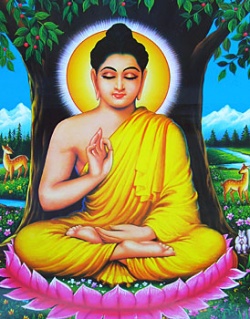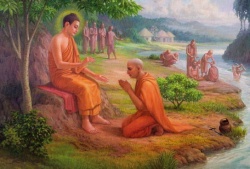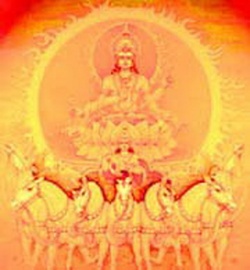Difference between revisions of "Buddha realm"
m (Text replacement - "application" to "application") |
|||
| Line 32: | Line 32: | ||
B. [[Bodhisattva's]] [[fearlessness]] arises from | B. [[Bodhisattva's]] [[fearlessness]] arises from | ||
:1. [[powers]] of [[memory]] | :1. [[powers]] of [[memory]] | ||
| − | :2. [[power]] of [[moral]] diagnosis and | + | :2. [[power]] of [[moral]] diagnosis and application of the remedy |
:3. [[power]] of ratiocination | :3. [[power]] of ratiocination | ||
:4. [[power]] of solving [[doubts]] | :4. [[power]] of solving [[doubts]] | ||
Latest revision as of 23:39, 26 October 2015
"If there are people who wish to understand all Buddhas of the three periods of time they should contemplate the nature of Dharma Realm. The Tathagatas (Buddhas) are made from mind alone."
Buddha is the highest state of existence of all sentient beings. There are many titles of Buddha, but the most common ones are summarised in Ten Titles of Buddha, which represent the characteristic of Buddha.
The Ten Titles of Buddha 10 Titles of Buddha are:
- 1. Tathagata --- the Thus Come Ones
- 2. Arhat --- Worthy of offerings
- 3. Samyak-sambuddha --- Of proper and universal knowledge
- 4. Vidyacarva-sampauna --- perfect in understanding and conduct
- 5. Sugata --- skilful in leaving the world through liberation
- 6. Lokavid --- perfect and complete understanding of all worldly Dharma
- 7. Anuttara --- unsurpassed kights
- 8. Purusa-damya-sarathi --- taming heroes
- 9. Sasta deramanusyanam --- teachers of gods and people
- 10. Buddha-lokanatha or Bhagavan --- Buddha, the World Honoured Ones
Buddha also has Ten Powers, which enables him to cross over the living beings, to perform all kinds of merits and virtues with psychic power and to dwell in liberation without hindrance.
Buddha treats all kinds of living beings to be equal. In the course of preaching and crossing over. Buddha is fearless and confident to overcome all difficulties. It is known as Four Fearlessness.
Four Fearlessness
There are four kinds of fearlessness, of which there are two groups:
A. Buddha's fearlessness arises from
- 1. his omniscience
- 2. perfection of character
- 3. overcoming opposition
- 4. ending of suffering
B. Bodhisattva's fearlessness arises from
- 1. powers of memory
- 2. power of moral diagnosis and application of the remedy
- 3. power of ratiocination
- 4. power of solving doubts
There are also Eighteen Different Characters of a Buddha as compared with Bodhisattva and other beings in Dharma Realms.
Eighteen Different Characters
- 1. His perfection of body (or person)
- 2. His perfection of mouth (or speech)
- 3. His perfection of memory
- 4. His perfection of impartiality to all
- 5. Serenity
- 6. Self-sacrifice
- 7. Unceasing desire to save
- 8. Unflagging zeal therein to save
- 9. Unfailing thought thereto to save
- 10. Unceasing wisdom to save
- 11. Powers of deliverance
- 12. The principle of the powers of deliverance
- 13. Revealing perfect wisdom in deed
- 14. Revealing perfect wisdom in word
- 15. Revealing perfect wisdom in thought
- 16. Perfect knowledge of the past
- 17. Perfect knowledge of the future
- 18. Perfect knowledge of the present
- 1. Dharma body --- the Buddha-body in its essential nature
- 2. Retribution body --- a body of bliss, which he/she "receives" for his/her own "use" and differentiation from all other Buddha
- 3. Response and transformation body --- Buddha can appear in any form to cross over the sentient beings.
Though Buddha is the highest enlightened beings with unconceiveable spiritual power, he is unable to do the following:
- 1. to eliminate or change the karmic retribution
- 2. to cross over those who reject Buddhism
- 3. to cross over the entire sentient beings in the Dharma Realms


